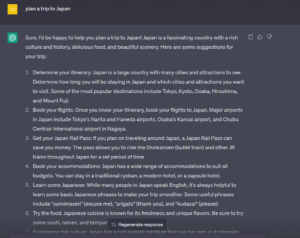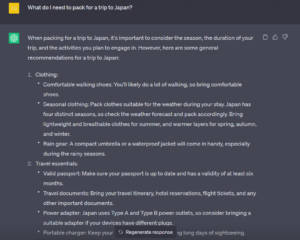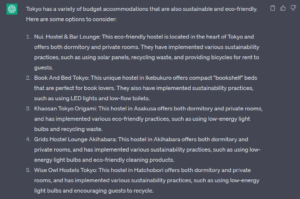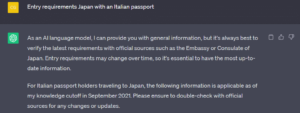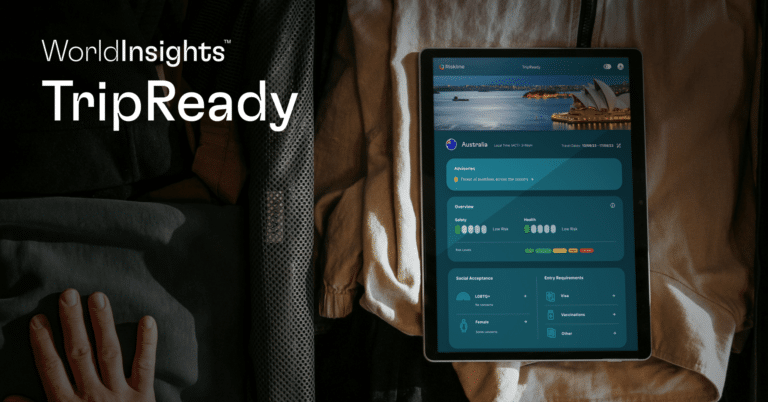A comparison between the conversational experience with ChatGPT and traditional travel planning methods
By Claudia Gualdi
ChatGPT for Travel Planning
ChatGPT is the latest innovation to grab the travel industry’s attention and cause a serious buzz about the future of AI in travel planning. Expedia recently incorporated the ChatGPT function to have a conversational search of the best destinations and timing, plus hotel recommendations. The plug-in then automatically saves ChatGPT’s hotel recommendations to users’ profiles in the Expedia app, so they can continue their trip planning by searching check-in dates, room availability and flights on Expedia’s platform. KAYAK also recently incorporated the ChatGPT function to offer more personalised and intuitive search experiences for flights, hotels, rental cars and vacation packages. Other travel agents and service providers are likely to follow this trend.
When it comes to planning a trip, we usually have a variety of criteria in our mind, such as budgeting, timeframe and personal taste and needs, among others. The Internet offers a multitude of options for each case, and since planning a trip can take days or weeks, it seems convenient to employ a system capable of screening thousands of sources to identify the best hotels, attractions, restaurants and modes of transport in a location. Chat-based AI tools can help to plan a trip and do research in lieu of interacting with travel agents or doing the research ourselves.
Asking ChatGPT to help plan a trip to Japan and help with some research
When I asked ChatGPT to help me plan a trip to Japan next spring, the bot provided me with a variety of detailed information about the culture, history, cuisine and customs of the country. Getting started from here was helpful – I could get an overview of what steps to take, and a feel for what the destination will feel like.
While the suggestions from this prompt included some action steps, unfortunately booking things isn’t (yet) possible in ChatGPT as it doesn’t have access to real-time pricing and availability information, nor the ability to make purchases on my behalf. So while I wanted to immediately check flight-related information and buy a Japan Rail Pass, this part of the travel search process still has to happen on other websites.
On the other hand, I found it helpful to get some quick and helpful recommendations about what to pack depending on the season, and especially a reminder to bring a travel adapter, which is essential if you need to use electronic devices in the country and I would have likely forgotten about otherwise. Perhaps, thanks to the bot, my collection of electrical adapters will not expand further than this.
Finding the limits to AI models in giving factual answers
I further tested the bot by asking for low-budget and sustainable accommodations in Tokyo, in order to compare some results found on the web. In order to analyse the answers, some technical context about how the bot sources information is necessary. When you ask the bot something like “best budget sustainable hotels in Tokyo”, each word is linked to a token and numbers are used as tokens rather than words because they can be processed more efficiently. ChatGPT was built and trained on hundreds of billions of words to predict the next tokens given on a specific sequence of input tokens, therefore the bot is able to generate an answer that is grammatically correct and semantically in line with what users would find on the internet.
However, this means the model can generate untruthful results or fail to answer. Indeed, the latter happened to me a couple of times, even by asking the same question I first got a “something went wrong” reply, and when I tried to remove the word “budget” from the query, I again got a failure to generate the response. However, I did eventually get some helpful results: for each accommodation, I got a list of steps taken by the property to provide more sustainable and environmentally friendly travel experiences to the guests.
This is because ChatGPT is “context-aware”. When you chat with the bot, it generates answers based on the context of the query and gives answers on numbered lists. It keeps generating results based on the previous answer’s contexts until you pause the chat, which ultimately enables the conversational tone.
Last but not least, I asked the bot which entry requirements I had to meet for entering Japan with an Italian passport. Besides a true and immediate indication of being exempt from a visa requirement, I didn’t get any useful facts. AI, in that case, can only provide general information and is not even up to date. In fact, the latest GPT models were trained until 2021, so the information provided could be misleading if users check requirements exclusively through ChatGPT, in fact the tool clarifies that it’s necessary to verify facts and refer to official documents and human-verified intelligence sources as the bot itself advises to double-check for updates.
The Verdict: ChatGPT can save some time, but it is still just a research tool
Overall, I think ChatGPT can be time-saving and convenient as an additional tool in support of browsing the web, especially in the early stage of planning when you are still looking for very general information about a destination. From the traveller’s perspective, the usual trip-planning process starts anyway with research on Google, so doing the first steps of the research on ChatGPT can somehow be considered an alternative offering a more conversational experience to the user. AI is already widely integrated into online booking platforms and websites, even though users are not really aware of it. There are multiple benefits also from the travel agent’s point of view: AI improves the personalisation of the offer, enables tailor recommendations, speeds up response times when it comes to customer care, and even fully replaces the presence of human staff dedicated to that function.
ChatGPT does have limitations which will need to be taken into consideration until further developments. Chatbots reply only to specific sets of commands or questions, and here comes their first limit. If the user’s query differs from the query learned, chatbots fail to answer or return vague answers, if not even incorrect or misleading. Moreover, the use of chatbots crossovers many delicate topics, such as user privacy violation concerns. Some AI-generated content has already resulted in media scandals and debates, especially regarding the use of AI in generating fake texts, images or videos nearly close to reality, accessible on the web by billions of users, raising concerns about misinformation and other negative outcomes associated with the circulation of such content.
The clearest limitation is in the information it provides. New ChatGPT models provide data until 2021, so information can be irrelevant or outdated, especially when it comes to checking entry requirements for a destination. Bots don’t have access to important travel-related data that can change from moment to moment, like visa policies, airline schedules or weather forecasts. Moreover, they still generate a lot of bugs and error messages, and answers really depend on the user’s proper use of proper grammar and spelling. Providing bots with a budget or a timeframe for a trip and asking concise questions trying to include preferences without sharing your personal data is still trial and error. Ultimately, a greater use of chatbots could lead to over-tourism in some areas, as they tend to provide information about the most popular and often over-touristed spots.
There’s no doubt that AI will increasingly be integrated into travel planning tools and services, but establishing balanced feedback about the conversation with a bot remains elusive. New versions of chatbots are being developed, and further improvements are needed before they can become really essential to the future of travel planning. Human-verified intelligence remains crucial to ensure effective and real support in travel planning.
*ChatGPT model used: text-davinci-002
Sources:
https://openai.com/blog/chatgpt
https://www.cnbc.com/2023/02/27/can-chatgpt-help-plan-a-vacation-heres-what-it-can-and-cant-do.html
https://thechainsaw.com/business/chatgpt-plugins-book-travel-find-food-sort-life-out/
https://mashable.com/article/expedia-chatgpt-in-app-travel-booking
https://www.usatoday.com/story/travel/2023/04/02/chatgpt-travel-agent-trip-planner/11546754002/
http://cntraveler.com/story/chatgpt-4-expedia-hotel-recommendations
https://www.cntraveler.com/story/ai-chatbots-future-of-travel
How ChatGPT works technically: https://www.youtube.com/watch?v=bSvTVREwSNw&ab_channel=ByteByteGo

